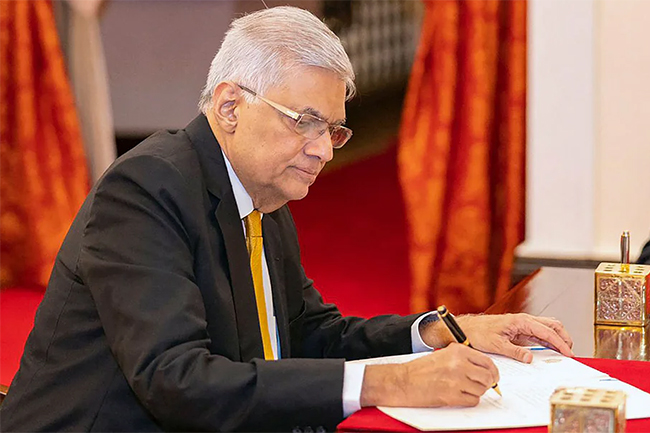Sri Lankan President Ranil Wickremesinghe has prorogued parliament till August 3. According to informed sources, the prorogation would enable him to reconstitute the various parliamentary committees and appoint suitable chairmen for them in the light of the new alignment of political forces in parliament after the exit of President Gotabaya Rajapaksa and Prime Minister Mahinda Rajapaksa and his own election as President.
The prorogation also enables him to formally address parliament as the new President of Sri Lanka. He would be delivering the equivalent of the “Throne Speech” in the UK parliament. The speech will have the mark of authority of the county’s President and also his view of the state of the country and its outlook for the future.
According to www.parliament.lk, the website of the parliament of Sri Lanka, prorogation is a temporary recess of parliament, which should not extend to a period of more than two months. However, such date for summoning parliament may be advanced by another Presidential Proclamation provided it is summoned for a date not less than three days from the date of such fresh proclamation.
Constitutional Provisions
During the prorogation, the Speaker continues to function and the Members retain their membership even though they do not attend parliament. The effect of a prorogation is to suspend all current business before the House. All proceedings pending at the time are quashed except impeachments. But they can be revived at the next session.
Paragraph (4) of Article 70 of the Constitution states: “All matters which having been duly brought before parliament, have not been disposed of at the time of the prorogation of parliament, may be proceeded with during the next session.”
At the beginning of a new session, all items of business which were in the Order Paper of Parliament need to be re-listed, if it is desired to continue with them.
Committees of Parliament
In terms of the Standing Orders of Parliament No. 114, the Committee of Selection has to be appointed and therefore, all the following Committees for Special Purposes cease to function during the recess or the prorogation of Parliament and all of them have to be re-constituted at the commencement of each session of Parliament except the Committee on High Posts, Sectoral Oversight Committees and Select Committees of Parliament as per provisions of Standing Order of Parliament Nos. 124(5), 111(2) and 109 respectively.
At the end of a prorogation, a new session begins and is ceremonially declared open by the President. He is empowered under the Constitution to make a Statement of Government Policy in parliament at the commencement of each Session of parliament and to preside at ceremonial sittings of parliament in terms of the provisions stipulated in Paragraph (2) of Article 33 of the Constitution.


